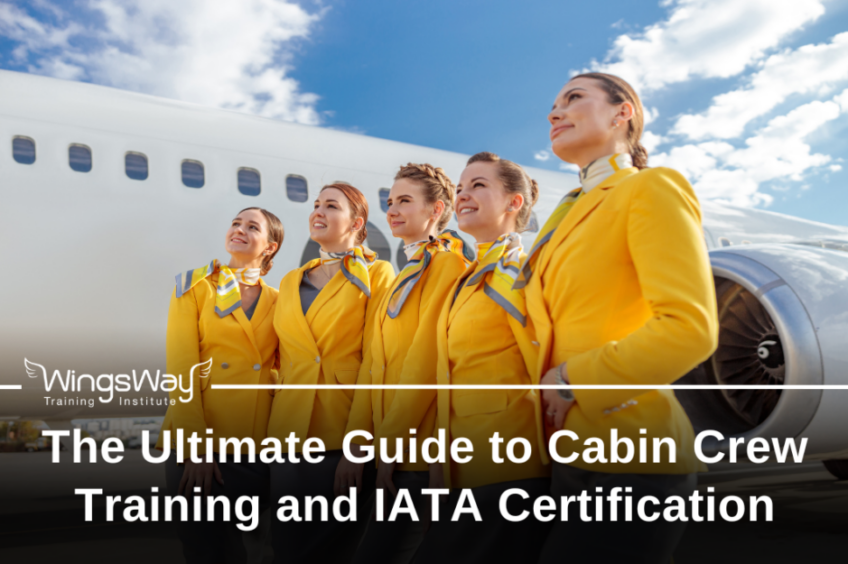
The Ultimate Guide to Cabin Crew Training and IATA Certification
You’re rushing to catch a flight, juggling luggage and tickets, barely managing to grab a bite. You finally board the plane and are greeted by a warm, reassuring smile from the cabin crew. In that moment, amidst the chaos, they make you feel at ease.
This first impression of a cabin crew—graceful, composed, and ready to assist—sets the tone for your journey. But what goes into creating such professionals who effortlessly balance safety, service, and hospitality?
Becoming part of an airline cabin crew is more than just a job—it’s a career that lets you travel the world, meet people all over the globe, and experience something new every day.
Let’s explore how cabin crew training can transform your aspirations into reality and why IATA certification is a game-changer for your career in aviation.
Why Choose Cabin Crew Training?
While hiring cabin crew, airlines look for skilled professionals who can manage safety, deliver exceptional service, and handle emergencies with calmness and expertise. Cabin crew training equips you with these essential skills through a combination of theoretical knowledge and hands-on practice.
This training doesn’t just focus on technical skills; it also prepares you to create positive passenger experiences, handle challenging situations confidently, and thrive in a multicultural environment. In short, it’s your gateway to a career that’s as exciting as it is rewarding.
Benefits of Cabin Crew Training
When you enrol in a cabin crew training programme, you’re preparing for a rewarding career. Here are a few benefits of the course:
- Global Opportunities: You will receive the certifications that are recognised worldwide, opening doors to airlines across the globe.
- Skill Development: You will learn vital skills such as first aid, safety protocols, and effective communication.
- Personality Development: The air hostess course will build your confidence, improve your grooming, and develop excellent customer service skills.
- Cultural Exposure: Work with people from all over the world, expanding your cultural awareness and adaptability.
Cabin Crew Course Outline
A well-rounded air hostess course prepares you for all aspects of the job. You’ll cover everything from safety procedures to customer service. Some key topics include:
- Safety and Emergency Training: Learn evacuation plans, fire safety, and how to handle medical emergencies.
- First Aid Certification:Master life-saving techniques and handle flight emergencies with confidence.
- Aircraft Learning: Gain required knowledge about the aircraft’s cabin, safety equipment, and operational procedures.
- Service Excellence: The cabin crew course helps you hone skills to deliver outstanding passenger service.
Why IATA Certification Matters
An IATA certification is a highly esteemed credential in the aviation industry. Here’s why it’s invaluable:
- Global Recognition: Airlines around the world trust IATA certifications, knowing they represent high standards in aviation training.
- Safety Assurance: You’ll receive training aligned with international safety protocols, ensuring you’re always prepared for any situation.
- Career Advancement: Many leading airlines prefer hiring candidates with IATA certification for roles that require advanced skills.
- Networking Opportunities: The IATA certification connects you with industry leaders and fellow trainees worldwide.
- Professional Credibility: It boosts your confidence and the probability of your employment in aviation.
Career Opportunities After Completing Cabin Crew Training
Once you complete your cabin crew training, a range of exciting career options await, including:
- Cabin Crew Supervisor: The individual oversees in-flight services and leads the team in providing customer service.
- Senior Air Cabin Crew: It fulfils a leadership role within the cabin crew.
- Airline Passenger Service Staff: The staff assists passengers with check-ins, boarding, and all customer service-related tasks.
- Ground Staff: Ground staff works behind the scenes in roles like baggage handling, coordination, and airport operations.
- Hospitality Roles: This role explores your skills for efficient hospitality jobs, including working in luxury hotels and resorts.
Dubai, a global aviation hub, offers unparalleled opportunities for aspirants. Cabin crew training in Dubai provides exposure to international standards, cultural diversity, and career growth.
👉 Also read – Insider tips on how to ace your cabin crew interview.
Why Choose WingsWay?
At WingsWay Training Institute in Dubai, the focus is on delivering a learner-centric experience that prepares you for success in aviation. Key features include:
- Industry-Relevant Curriculum: The training course is tailored to meet the evolving needs of the aviation sector.
- State-of-the-Art Facilities: You’ll train in simulated environments that mirror real-world aviation scenarios.
- Dedicated Career Support: At Wingsway, the trainers guide you in job placement and interview preparation to give you a good start in your career.
- Internationally Recognised Certification: It provides globally recognised qualifications and certifications that increase job opportunities.
- Experienced Instructors: You will be learning from aviation experts who provide real-world insights and guidance.
- Value-adds: WingsWay’s value-adds provide students with a holistic learning experience and prepare them to get on the job in just two months.
With WingsWay, you’ll be fully prepared to succeed in the fast-paced world of aviation.
Ready to Take Off?
Start your journey toward a high-flying career today with WingsWay’s comprehensive cabin crew training program. With the right training, certification, and support, your dream of working in aviation can become a reality. Enrol in our IATA-certified cabin crew training course today!
FAQs About Cabin Crew Training
- What qualifications do I need to start cabin crew training?
Most courses require a high school diploma, good English and communication skills, and basic physical and mental fitness. - How long is the cabin crew course?
Typically, a cabin crew training course lasts between 3 to 6 months, depending on the training institute and specific curriculum. - Why is cabin crew training in Dubai a good choice?
Dubai is a global aviation hub, offering exposure to international standards, cultural diversity, and wonderful career opportunities. - Is IATA certification necessary for cabin crew roles?
While it’s not required, IATA certification is highly valued and can give you a competitive edge in the job market. - Can cabin crew training help in other industries?
Absolutely! The skills you gain—like customer service, communication, hospitality, first aid, coordination, and management—are highly required in other sectors.



